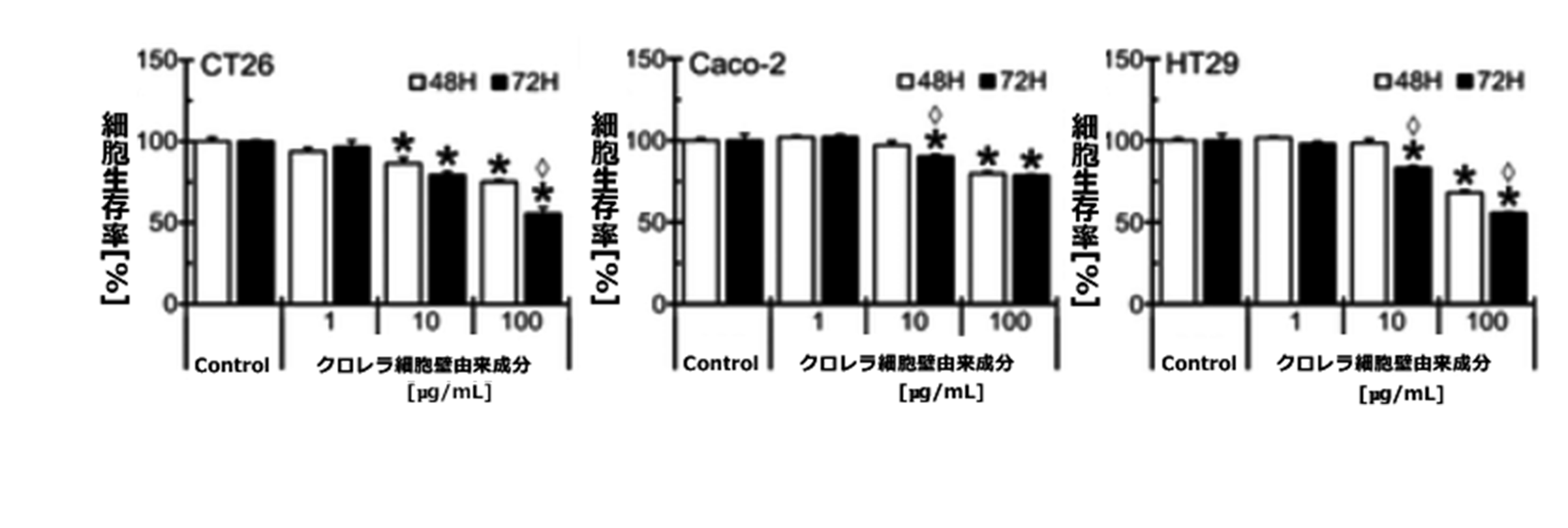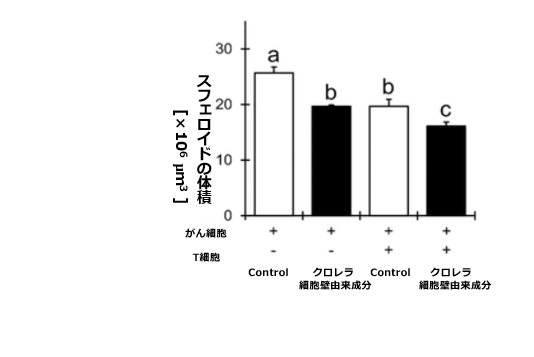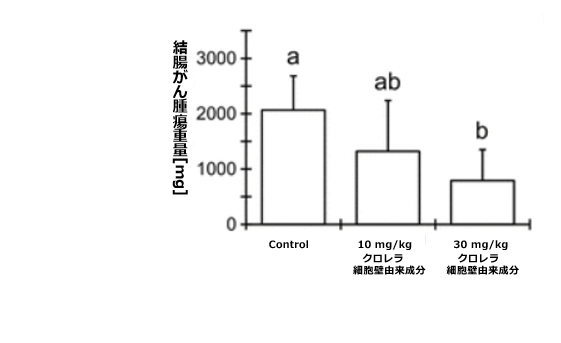Press Releases
* Please note that the news release contains the content at the time of the announcement and may differ from the latest information.
Confirmed research results suggesting that chlorella cell wall-derived components suppress colon cancer via immunity
Euglena Co., Ltd.
Euglena Co., Ltd. (Headquarters: Minato-ku, Tokyo, President: Mitsuru Izumo) has collaborated with Professor Masaaki Tamura of Kansas State University to find that chlorella cell wall-derived components * 1 suppress colon cancer via immunity. We confirmed the suggested research results.
The results of this research were published in the medical journal "Integrative Cancer Therapies" on February 1, 2020 (https://journals.sagepub.com/doi/10.1177/1534735419900555).
* 1 Ingredients contained in the supernatant of chlorella culture solution.
■ Purpose of research
Cancer is the most common cause of death in Japan, and the prevalence of colorectal cancer is the highest in men and the second highest in women * 2 compared to other cancers. In this study, we evaluated the antitumor activity and immunomodulatory function in human cell tests and colon cancer mouse models for the effects of chlorella cell wall-derived components on colon cancer, which is a type of colorectal cancer.
Chlorella is a single-celled microalgae that contains abundant types of nutrients such as vitamins, minerals, amino acids, carotenoids, unsaturated fatty acids, and chlorophyll. Chlorella has had an anticancer effect * 3 and lifestyles. Research results suggesting the effect of improving habitual diseases * 4 have been reported.
* 2 National Cancer Center 2019 Cancer Statistics Prediction (https://ganjoho.jp/reg_stat/statistics/stat/short_pred.html).
* 3 Tanaka K, Konishi F, Himeno K, Taniguchi K, Nomoto K (1984) Augmentation of antitumor resistance by a strain of unicellular green algae, Chlorella vulgaris. Cancer Immunol Immunother 17: 90-94.
* 4 Mizoguchi T, Takehara I, Masuzawa T, Saito T, Naoki Y (2008) Nutrigenomic studies of effects of Chlorella on subjects with high-risk factors for lifestyle-related diseases. J Med Food 11: 395-404.
■ Research content and results
① Colon cancer cells (CT26, Caco-2, HT29 ※Five) Growth was suppressed in a dose- and time-dependent manner
When chlorella cell wall-derived components were added during culture of mouse and human colon cancer cells and the proliferation rate of colon cancer cells was measured, the higher the concentration of the chlorella cell wall-derived components and the longer the culture time, the more. , The growth of colon cancer cells was suppressed.
* 5 Type of colon cancer cells.


② Immature T cells (immune cells) * 6In a three-dimensional cell culture coexisting with mouse colon cancer spheroids * 7Growth was significantly suppressed
When chlorella cell wall-derived components were added during culture of mouse colon cancer spheroids and the growth of colon cancer spheroids was observed, the growth of colon cancer spheroids was significantly suppressed. When immature T cells coexisted with colon cancer spheroids, the growth of colon cancer spheroids was further significantly suppressed in the presence of chlorella cell wall-derived components. This suggests that chlorella cell wall-derived components may have helped immature T cells mature, thereby inhibiting the growth of colon cancer spheroids.
* 6 A type of lymphocyte among white blood cells. Involved in cell-mediated immunity.
* 7 A cell aggregate in a stadium where cells are aggregated and aggregated. It is used in experiments as a reconstruction system for biologically similar structures.


③ Mouse colon cancer was suppressed
Intraperitoneal administration of chlorella cell wall-derived components in mice that developed colon cancer significantly reduced the growth of colon cancer tumors. This is because the chlorella cell wall-derived component increases T cells in immune cells and granulocytes. * 8 It indicates that reducing the number of patients may be involved as a mechanism.
* 8 A type of white blood cell composed of neutrophils, eosinophils, and basophils.


<About the microalga Chlorella>
Microalga Chlorella is a small alga that contains a wide variety of nutrients such as vitamins, minerals, amino acids, carotenoids, unsaturated fatty acids, and chlorophyll.
<About Euglena Co., Ltd.>
In 2005, we succeeded in establishing the world's first edible outdoor mass culture technology for the Euglena In addition to developing and selling functional foods and cosmetics that utilize the Euglena and Chlorella produced on Ishigaki Island, we are also conducting research toward the production of biofuels. Listed on TSE Mothers in December 2012. TSE First Section market change in December 2014. The management philosophy is "to make people and the earth healthy". https://euglena.jp
* Click here for the PDF version.
-Contact for inquiries from the press-
Euglena Co., Ltd. Corporate Communication Division
